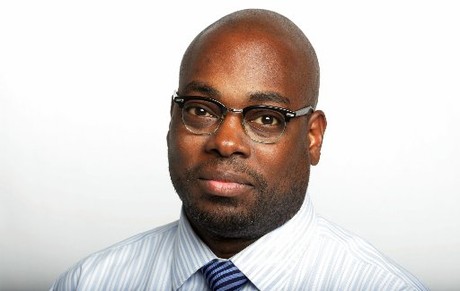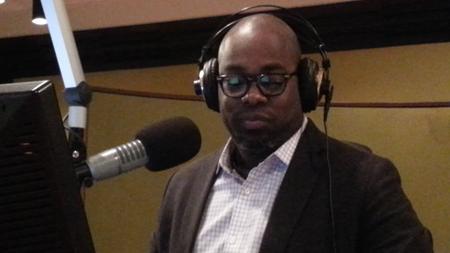Henderson: Finding My Family History in Natchez
Stephen Henderson reads his essay about his journey to Natchez to find his family’s history.


The following is an essay written by Detroit Today host Stephen Henderson. You can read it in The Detroit Free Press, or listen to Stephen read it here. Stephen writes:
I went back to Natchez, Miss., in January of 2015, to piece together the parts of my late father’s history that were unknown or forgotten, the details from his hometown that any son would like to know about the man who gave him his smile or his gait.
Standing in the rain beneath stoic gray clouds in the town’s National Cemetery, I had returned, 30 years after my father’s funeral, to reconnect with a past that, for me, is immediate, but unfamiliar.
I wasn’t looking for deeper history. But I found it, right next door — in the prominent City Cemetery, where a name in the brochure stood out: Thomas Henderson, described as a wealthy planter and cotton broker. Turns out he owned six plantations in Natchez, and his brother owned several more. He also owned people — hundreds of slaves who, it turns out, were likely members of my family, and who took his name and passed it down, all these generations, to me.
The lesson is stark, and halting. In America, it’s possible to look back, even to an instant past, and find yourself gazing up-close into an undiscovered prism of race and racial inequality that lies at the foot of all our histories.
It is all just over our shoulders, around familiar corners or — in the case of that day in the Mississippi cemetery — right next door.
The Martin Luther King Jr. Holiday has become a catch-all for black remembrance and celebration, a day to look forward, as King so often did, to progress, but also to note how much more remains to be done.
Indeed, my journey to Mississippi to learn more about the father I lost when I was 14 years old in many ways was born of looking forward. For the past year, I have been working to salvage the abandoned house on the west side of Detroit where my dad lived after migrating north in the late 1950s and where I was born in 1970. In my effort at progress, I want to see the house remade as a writer’s center — a space of rebirth in a long-neglected part of my city.
But in that looking forward, I came almost immediately face to face with America’s darkest past and the self-kidding and facades that are too often erected to obscure it.
Thomas Henderson’s greatest legacy, for instance, is the mansion he built in central Natchez just before the Civil War broke out. Like many similar homes, his is now a museum of sorts, where his furniture and books and paintings are all preserved the way he would have had them — and where guides dressed in antebellum clothing walk you through the cavernous halls, explaining the various things he owned and what life was like for him.
The whole place is bathed in escapist euphemism. Henderson is described as a “planter,” even though it was slaves who surely did the farming on his plantations. He is called a cotton baron, not called out asa plantation owner, whose wealth and way of life were sustained through the subjugation of an entire race.
The only mention of slavery in the house surfaces in a snapshot of his will, in which he deeds three of his “negro men” to one of his daughters.
But my very presence in the house, even as a visitor in modern times, shatters the myth-making that obscures how quickly connections can be drawn.
The chance discovery of a name in a Mississippi cemetery raises complicated new questions in trying to better understand my past.Research and testing will determine exactly what the relationship was between Thomas Henderson and my forebears. What are the chances, in such a small place, where my family goes back generations, that he wasn’t an owner? Potentially more haunting: What are the chances, given prevalence of plantation rape, that Thomas Henderson and I may escape connection through blood?
My uncanny discovery of his legacy, so close in physical proximity to my own father’s grave, reminds of the distasteful ties we all share, the bonds that grew from bondage and inhuman interpretations of humanity’s obligations to itself. It’s a flash of awful recognition — stark and jarring to the point of astonishment and emotional dislocation.
Late last month, I went back to Natchez again, to begin piecing together more of my own history, my father’s, and Thomas Henderson’s — all of it now a doorway to much fuller understanding than I had initially sought.
There is truth in the journey. And in discovery along the way.
And there is American purpose in remembering that this is all of our stories — not distant but right there, if only we endeavor to look just beyond ourselves.
Stephen Henderson is editorial page editor for the Free Press. He is the host of “Detroit Today,” which airs on weekdays on 101.9 FM (WDET) and “American Black Journal,” which airs at 12:30 p.m. Sundays on Detroit Public Television. Follow Henderson on Twitter @ShendersonFreep, or contact him at 313-222-6659 or shenderson600@freepress.com.
